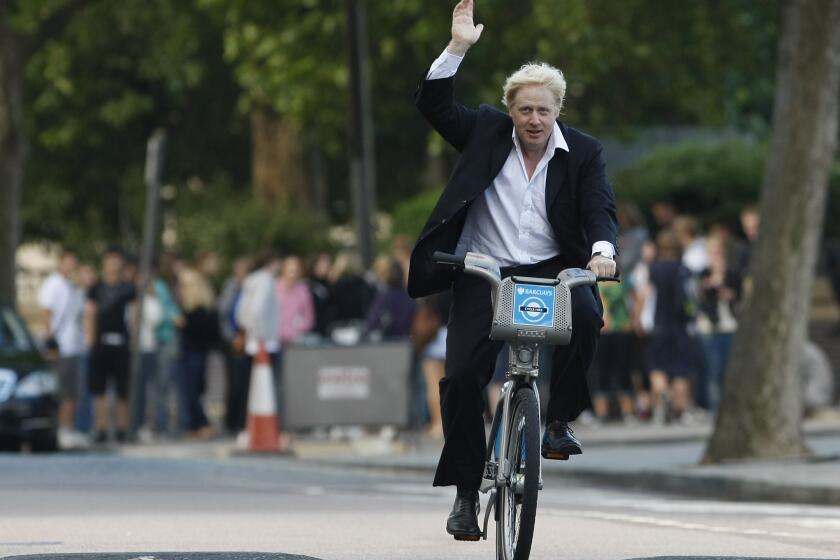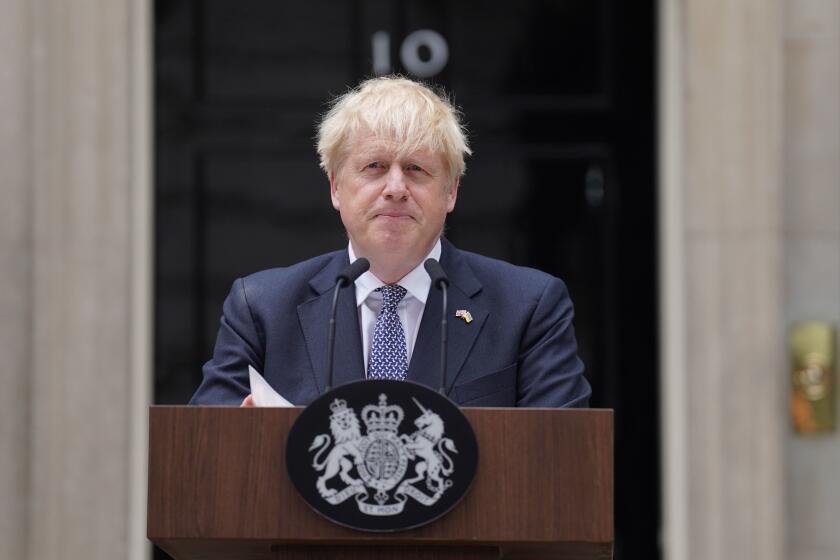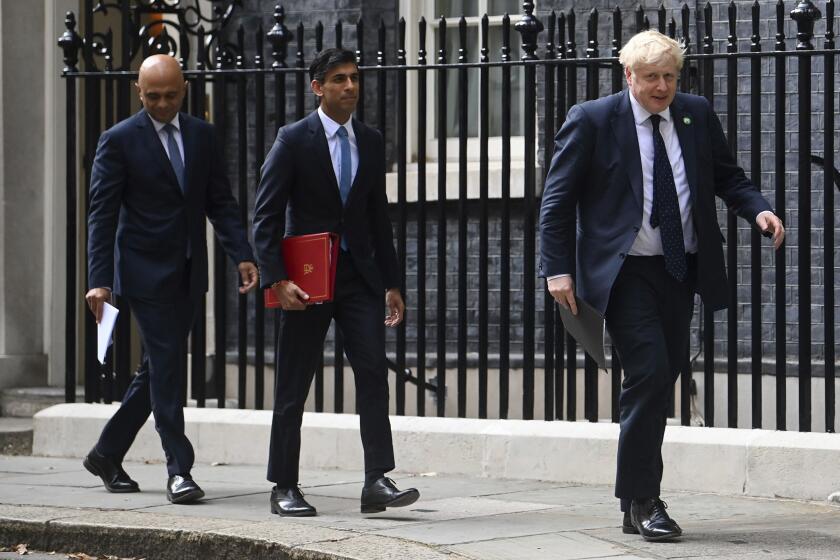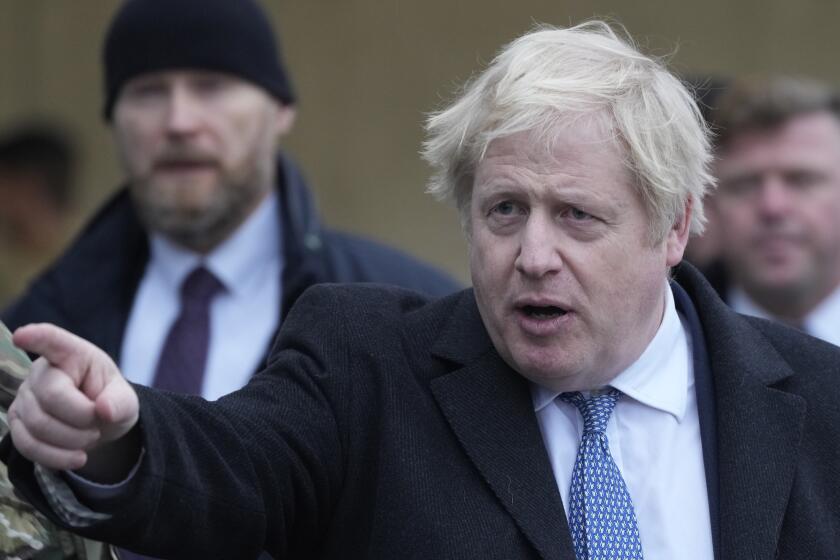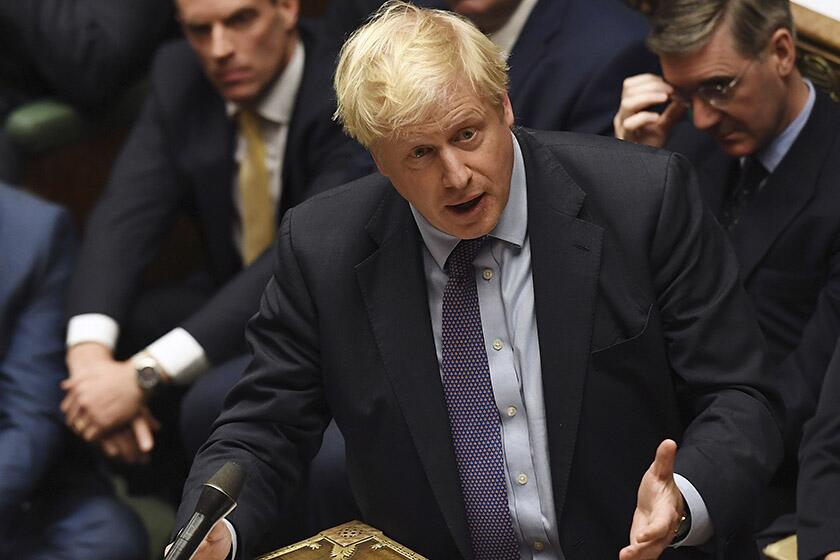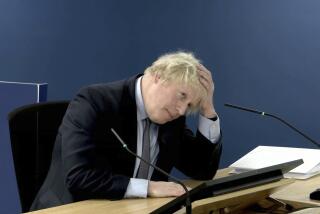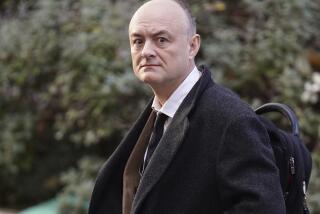‘Remarkable gifts’ but an ‘absence of conscience’: Boris Johnson was felled by his flaws
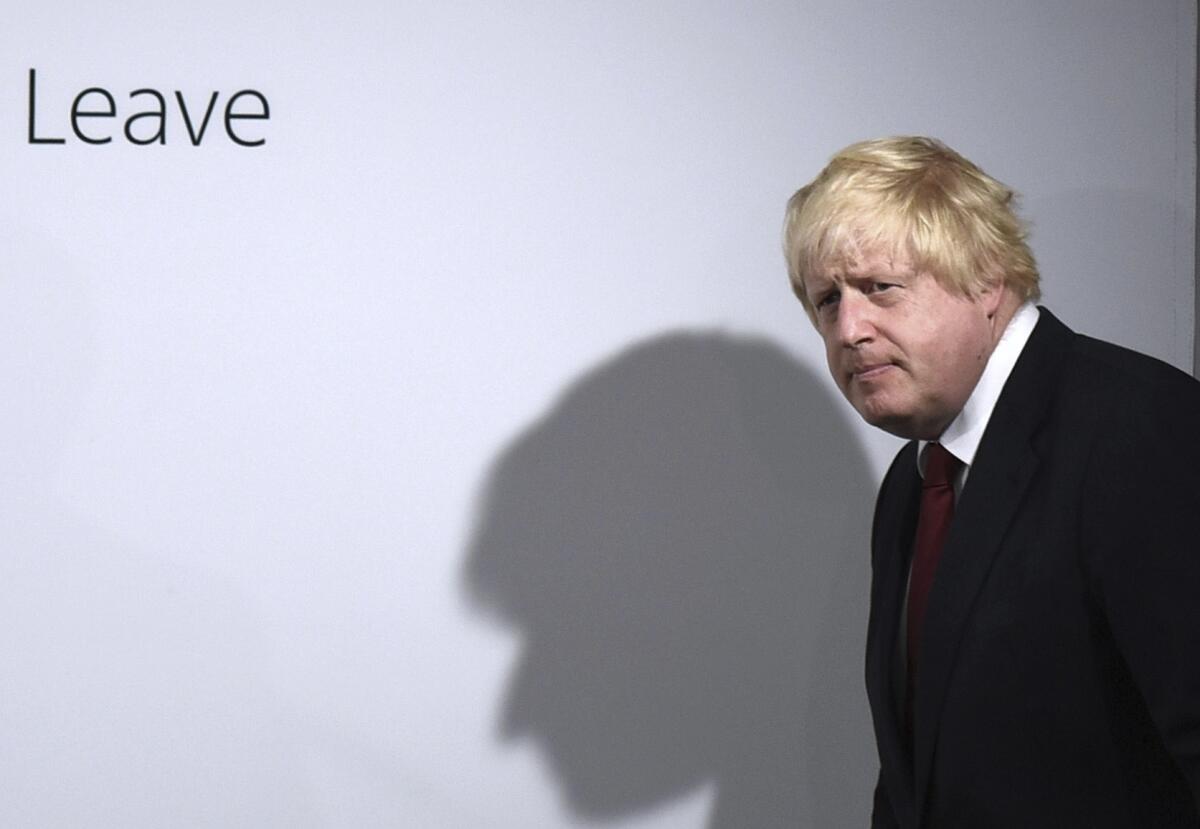
LONDON — Boris Johnson wanted to be like his hero, Winston Churchill: a larger-than-life character who led Britain through a time of crisis. But he was felled by crises of his own making, as a trickle of ethics allegations became a flood that engulfed his government and turned his own party against him.
Johnson agreed to resign Thursday after the chorus of disapproval from within his own party became too much for him to withstand.
The move came after months of scandals that saw Johnson fined by police and criticized by an investigator’s report for allowing rule-breaking parties in his office while Britain was in COVID-19 lockdown.
LONDON — Prime Minister Boris Johnson announced his resignation Thursday amid a mass revolt by top members of his government, marking an end to three tumultuous years in power in which he brazenly bent and sometimes broke the rules of British politics.
Johnson urged his party and country to “move on” and focus on Britain’s struggling economy and the war in Ukraine. But two thumping special election defeats for his Conservative Party and allegations of sexual misconduct against a senior party official sealed the fate of a politician whose ability to survive scandals was legendary.
Johnson’s career was always one of extremes. He took Britain out of the European Union and led the nation during a pandemic that endangered his own life, but was toppled after flouting restrictions he imposed in response to COVID-19. Revelations of parties in Johnson’s Downing Street office while the country was in lockdown in 2020 and 2021 caused outrage and tested the patience of the Conservative Party for its election-winning but erratic leader.
An investigation by senior civil servant Sue Gray criticized “failures of leadership and judgment” in Johnson’s government for allowing multiple rule-breaking gatherings in 2020 and 2021. Dozens of people were issued police fines, including the prime minister, his wife and then-Chancellor of the Exchequer Rishi Sunak.
The prime minister had spent months struggling to stay in power amid growing discontent within his party and among the public.
It was, seemingly, the final blow to the career of one of the most divisive politicians Britain has ever known. A sympathetic biographer, Andrew Gimson, called Johnson “the man who takes on the Establishment and wins.” But for former member of Parliament Rory Stewart, who ran unsuccessfully against Johnson for the Conservative leadership in 2019, he was “probably the best liar we’ve ever had as prime minister.”
Johnson’s selection as Conservative leader and prime minister in July 2019 capped a rollercoaster journey to the top. He had held major offices, including London mayor and British foreign secretary, but also spent periods on the political sidelines after self-inflicted gaffes.
Many times, Alexander Boris de Pfeffel Johnson was written off as a lightweight who lacked the seriousness needed in a leader. He sometimes colluded in that impression, fostering the image of a rumpled, Latin-spouting populist with a mop of blond hair who didn’t take himself too seriously. He once said he had as much chance of becoming prime minister as of finding Elvis Presley on Mars.
First elected to Parliament in 2001, he moved for years between journalism and politics, becoming well-known as a newspaper columnist and guest on TV comedy quiz shows.
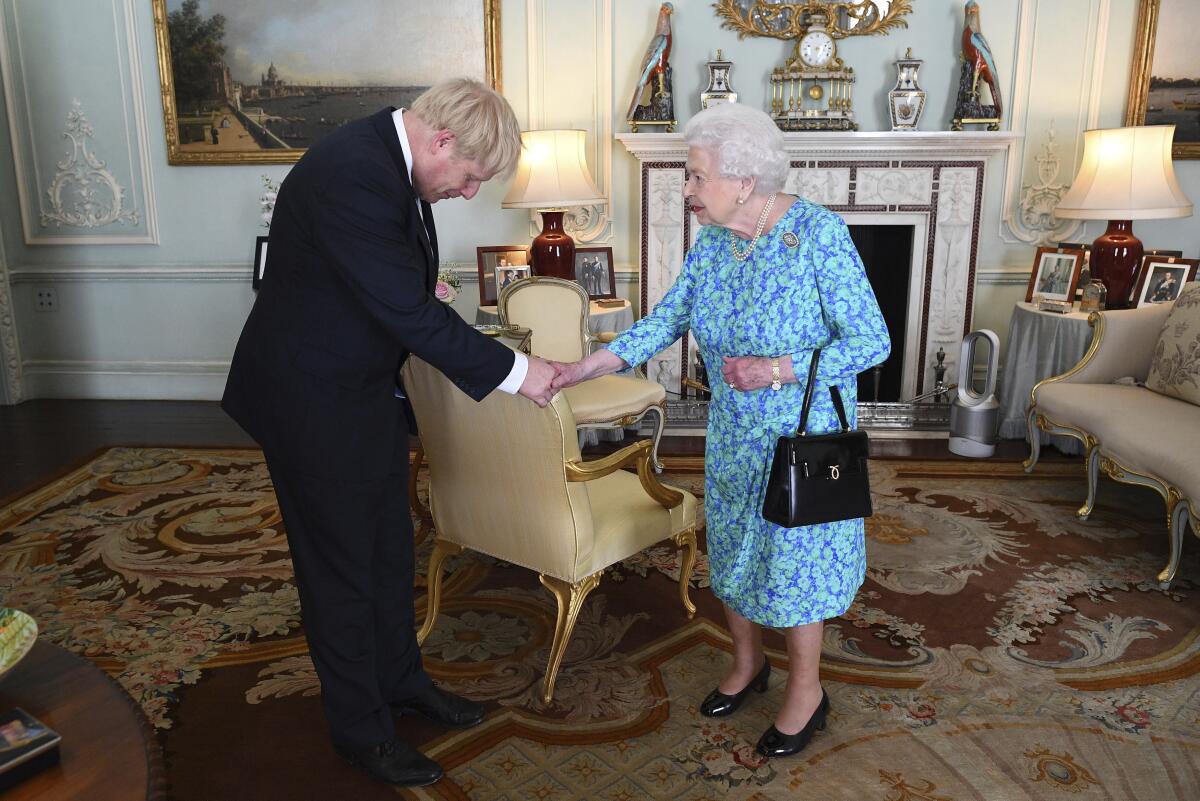
He sometimes made offensive remarks — calling Papua New Guineans cannibals and comparing Muslim women who wear face-covering veils to “letter boxes” — that caused furor and that he shrugged off as jokes.
His first big political post, as mayor of London between 2008 and 2016, suited his talents. He built a high global profile as a cheerful ambassador for the city — an image exemplified when he got stuck on a zip line during the 2012 London Olympics, waving Union Jacks as he dangled in the air.
Critics blasted his backing for vanity projects, including a little-used cable car and a never-built “garden bridge” over the Thames, and warned that he could not be trusted. As a young journalist, Johnson had been fired by the Times of London for making up a quote. He was once recorded promising to give a friend the address of a journalist whom the friend wanted beaten up. He was sacked from a senior Conservative post for lying about an extramarital affair.
As Brussels correspondent for the Daily Telegraph, he specialized in exaggerated stories of EU waste and ridiculous red tape — tales that helped turn British opinion against the bloc, with far-reaching consequences.
Treasury and Health ministers exit, possibly spelling the end of Prime Minister Boris Johnson’s leadership after months of scandals.
Historian Max Hastings, Johnson’s former boss at the Telegraph, later called him “a man of remarkable gifts, flawed by an absence of conscience, principle or scruple.”
It was Brexit that gave Johnson his big chance. Johnson’s co-leadership of the campaign to take Britain out of the European Union helped the “Leave” side secure a narrow victory in a 2016 referendum.
His bullish energy was essential to the victory. So, critics said, were the campaign’s lies — such as the false claim that Britain sent 350 million pounds a week to the EU, money that could instead be spent on Britain’s National Health Service.
The Brexit vote was a triumph for Johnson, but it did not immediately make him prime minister. Theresa May won a Conservative Party leadership contest and took the top job.
The British leader has been faulted for being too slow to aid Ukrainian refugees and impose sanctions on Russian oligarchs.
Johnson had to watch and wait for three years as May struggled to secure a divorce deal acceptable to the EU and Britain’s Parliament. When she failed, Johnson’s promise to “get Brexit done” won him the prime minister’s job, which was widely known to be his fond ambition. In December 2019, he secured the Conservative Party its biggest parliamentary majority since Margaret Thatcher in the 1980s.
His first months in office were fraught. Lawmakers resisted his Brexit plans and he suspended Parliament — until Britain’s Supreme Court ruled the move illegal. Opponents said it was another example of Johnson’s rule-breaking and disregard for the law.
After several delays to the departure date, Johnson achieved his goal of leading Britain out of the EU on Jan. 31, 2020. Yet despite Johnson’s slogan, Brexit was far from “done,” with many issues still to be resolved, including the delicate status of Northern Ireland, an ongoing source of friction between Britain and the bloc.
Then the pandemic struck. Johnson initially appeared relaxed about the threat the new coronavirus posed and hesitated to impose restrictions on movement and business activity.
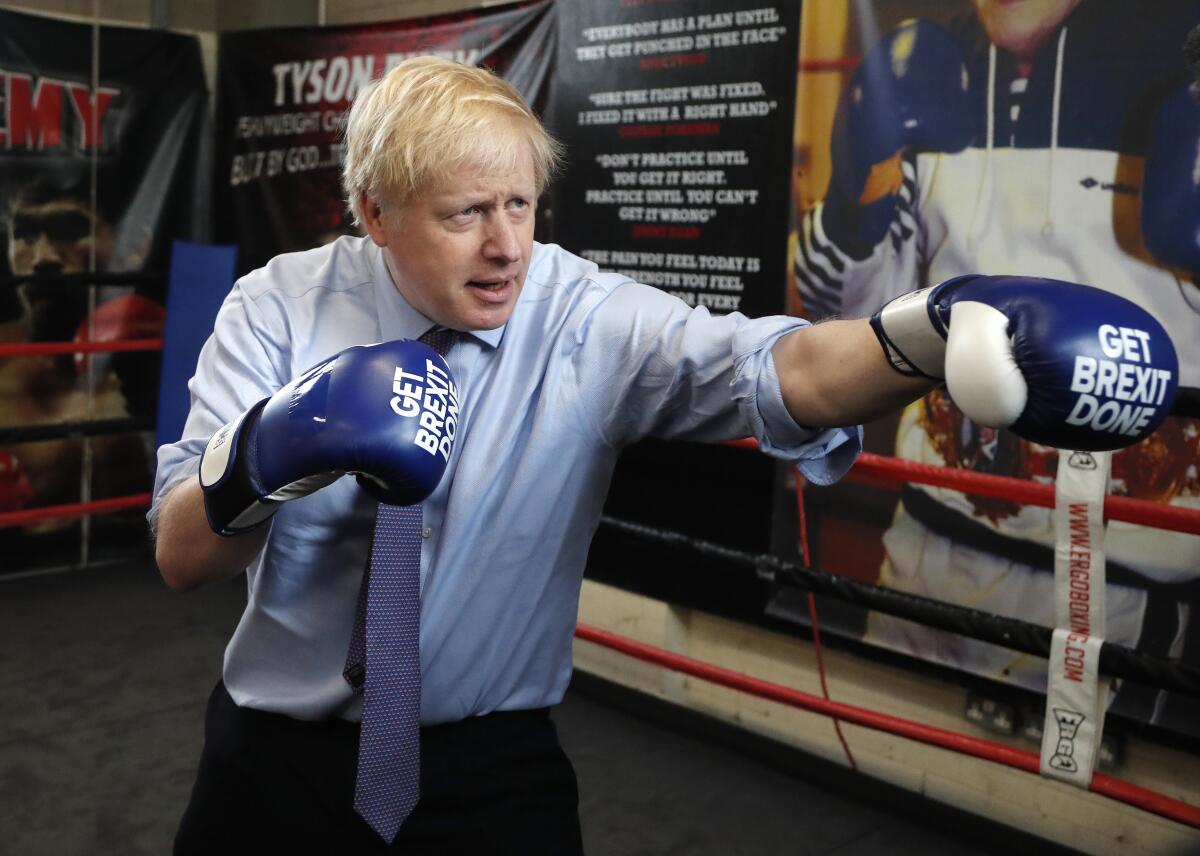
He changed course and imposed a lockdown in late March 2020, and days later came down with COVID-19 himself, spending several nights in intensive care in a London hospital. He later said it had been “touch and go” whether he would be put on a ventilator.
Johnson’s handling of the pandemic drew decidedly mixed reviews. By nature a laissez-faire politician, he bristled at having to impose restrictions, and early on spoke rashly of the pandemic being over within weeks.
Britain went on to have one of the highest COVID-19 death tolls in Europe and some of the longest lockdowns. But the government got one big thing right, investing early in vaccine development and purchases and delivering doses to the bulk of the population.
The vaccination success brought Johnson a poll boost, but his troubles were growing. He faced allegations over money from a Conservative donor that he’d used to refurbish his official apartment. And he received a huge backlash when the government tried to change parliamentary ethics rules after a Conservative lawmaker was found guilty of illicit lobbying.
News Alerts
Get breaking news, investigations, analysis and more signature journalism from the Los Angeles Times in your inbox.
You may occasionally receive promotional content from the Los Angeles Times.
The big blow came when details emerged of parties held in Johnson’s Downing Street office and home while the country was in lockdown.
The details were sometimes comic — staff smuggling booze into Downing Street in a suitcase, a supporter’s claim that Johnson had been “ambushed with a cake” at a surprise birthday party. But the anger they sparked was real. Millions of Britons had followed the rules, unable to visit friends and family or even say goodbye to dying relatives in hospitals.
Hannah Bunting, a University of Exeter lecturer who has studied public trust in politicians, said that, in the past, voters were “well-aware of Johnson’s flaws, and this didn’t dim his electoral popularity.”
The party claims changed that, because people could “compare their actions to his,” she said. “Most of us complied with government restrictions because we thought it was in everyone’s interests. We made sacrifices to ensure people were safe.”
Revelations that the prime minister and his staff repeatedly flouted their own coronavirus rules and held parties have elicited outrage in Britain.
Russia’s invasion of Ukraine on Feb. 24 gave Britain’s politicians and media more urgent things to focus on. It brought a reprieve from domestic woes for Johnson, who won international praise for his military, financial and moral support for Ukraine. He traveled to Kyiv twice to meet President Voldymyr Zelensky, who praised him as a reliable and welcome ally.
But the special election defeats last month — one in a district that had voted Conservative for a century — drove home to Conservatives that anger at “Partygate” had not gone away.
Soon after, Johnson was caught changing his story on the way he handled allegations of sexual misconduct by a senior member of his government. Ministers who had defended Johnson through thick and thin had finally had enough. They quit the government in droves, leaving Johnson no choice but to resign.
Johnson’s run of miraculous escapes had finally come to an end.
More to Read
Sign up for Essential California
The most important California stories and recommendations in your inbox every morning.
You may occasionally receive promotional content from the Los Angeles Times.
